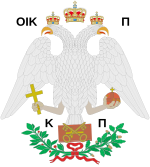
Back Ekumeniese Patriargaat van Konstantinopel Afrikaans بطريركية القسطنطينية المسكونية Arabic بطريركية القسطنطينه المسكونيه ARZ Konstantinopol Pravoslav Kilsəsi Azerbaijani Канстанцінопальскі Патрыярхат Byelorussian Канстантынопальская праваслаўная царква BE-X-OLD Вселенска патриаршия Bulgarian কনস্টান্টিনোপলের সার্বজনীন পাদ্রিতন্ত্র Bengali/Bangla Patriarchiezh eukumenek Kergustentin Breton Església Ortodoxa de Constantinoble Catalan
| Ecumenical Patriarchate of Constantinople | |
|---|---|
 Symbol of the Ecumenical Patriarchate of Constantinople, as found atop the front entrance of the Patriarchal Cathedral of St. George | |
| Abbreviation | EP |
| Classification | Eastern Orthodox |
| Orientation | Greek Orthodoxy |
| Scripture | Septuagint, New Testament |
| Theology | Eastern Orthodox theology |
| Polity | Episcopal |
| Primate | Archbishop of Constantinople-New Rome and Ecumenical Patriarch Bartholomew I |
| Bishops | 125 (73 acting, 52 titular) |
| Parishes | 525 (in the United States)[1] |
| Monastics | ~1,800 (Mt. Athos) |
| Monasteries | 20 (U.S),[1] 20 (Mt. Athos), 8 (Australia), 6 (Meteora), 2 (Korea) |
| Language | Greek, Turkish, Ukrainian, English, French, Arabic |
| Headquarters | Hagia Sophia, Constantinople (537–1453) Church of the Holy Apostles (1453–1456) Pammakaristos Church (1456–1587) Church of the Panagia Paramythia (1587–1597) Church of St. Demetrius Xyloportas (1597–1601) St. George's Cathedral, Istanbul (1601–present) 41°01′45″N 28°57′06″E / 41.02917°N 28.95167°E |
| Territory | Istanbul, most of Turkey, Mount Athos, Crete, part of northern Greece, the Dodecanese, Middle East, Greek Orthodox Churches in the Diaspora |
| Independence | 330 AD from the Metropolis of Heraclea |
| Separations | several, see list below |
| Members | ~200,000 (Turkey)[2][3] ~3,800,000 (Greece) ~5,250,000 (in diaspora)[4] =9,250,000 (total) |
| Official website | ec-patr.org |
| Part of a series on the |
| Eastern Orthodox Church |
|---|
| Overview |
The Ecumenical Patriarchate of Constantinople (Greek: Οἰκουμενικὸν Πατριαρχεῖον Κωνσταντινουπόλεως, romanized: Oikoumenikón Patriarkhíon Konstantinoupóleos, IPA: [ikumeniˈkon patriarˈçion konstandinuˈpoleos]; Latin: Patriarchatus Oecumenicus Constantinopolitanus;[5] Turkish: Rum Ortodoks Patrikhanesi, İstanbul Ekümenik Patrikhanesi,[6][7] "Roman Orthodox Patriarchate, Ecumenical Patriarchate of Istanbul") is one of the fifteen to seventeen autocephalous churches that together compose the Eastern Orthodox Church. It is headed by the Ecumenical Patriarch of Constantinople.
Because of its historical location as the capital of the former Eastern Roman (Byzantine) Empire and its role as the mother church of most modern Orthodox churches, Constantinople holds a special place of honor within Orthodoxy and serves as the seat for the Ecumenical Patriarch, who enjoys the status of primus inter pares (first among equals) among the world's Eastern Orthodox prelates and is regarded as the representative and spiritual leader of Eastern Orthodox Christians.[8][9][10][11][12][13]
The international status of the Ecumenical Patriarchate is not officially recognized by the Republic of Turkey; it only recognises the authority of the Ecumenical Patriarchate over the Greek minority in Istanbul, Bozcaada and Gökçeada.[14]
The Ecumenical Patriarchate promotes the expansion of the Christian faith and Eastern Orthodox doctrine, and the Ecumenical Patriarchs are involved in ecumenism and interfaith dialogue, charitable work, and the defense of Orthodox Christian traditions. Prominent issues for the Ecumenical Patriarchate's policy in the 21st century include the safety of the believers in the Middle East, reconciliation of the Eastern Orthodox and Catholic churches,[15] and the reopening of the Theological School of Halki, which was closed down by the Turkish authorities in 1971.[16][17]
- ^ a b Krindatch, Alexei (2011). Atlas of American Orthodox Christian Churches. Brookline, MA: Holy Cross Orthodox Press. p. 143. ISBN 978-1-935317-23-4.
- ^ "'Turkey (Türkiye)'". U.S. Department of State.
- ^ Erol, Su (2015). "The Syriacs of Turkey". Archives de sciences sociales des religions (171): 59–80. doi:10.4000/assr.27027. Archived from the original on 2019-06-26.
- ^ "'Ecumenical Patriarchate'". World Council of Churches.
- ^ Pontificia Commissio Codici Iuris Canonici Orientalis Recognoscendo Vatican City State, 1978, p. 3 (in Latin)
- ^ Ortaylı, İlber (2003). "Osmanlı Barışı", p. 14. ISBN 975-6571-50-0.
- ^ In Turkey it is also referred to unofficially as Fener Rum Patrikhanesi, "Roman Patriarchate of the Phanar"
- ^ Fairchild, Mary. "Christianity:Basics:Eastern Orthodox Church Denomination". about.com. Archived from the original on 5 June 2016. Retrieved 22 May 2014.
- ^ "The Patriarch Bartholomew". 60 Minutes. CBS. 20 December 2009. Archived from the original on 2021-06-26. Retrieved 26 June 2021.
- ^ "Biography - The Ecumenical Patriarchate". www.patriarchate.org. Retrieved 2019-12-11.
- ^ Winfield, Nicole; Fraser, Suzan (30 November 2014). "Pope Francis Bows, Asks For Blessing From Ecumenical Patriarch Bartholomew In Extraordinary Display Of Christian Unity". Huffington Post. Archived from the original on 2016-03-17. Retrieved 2019-12-11.
- ^ Finding Global Balance. World Bank Publications. 2005. p. 119. Retrieved 2 August 2015.
His All Holiness is the spiritual leader of 300 million Orthodox Christians worldwide
- ^ "Who is the Ecumenical Patriarch? - Apostolic Pilgrimage of Pope Francis and Ecumenical Patriarch Bartholomew to Jerusalem". www.apostolicpilgrimage.org. Archived from the original on 2021-06-04. Retrieved 2019-12-11.
- ^ "Fener Rum Patrikhanesinin "ekümeniklik" İddiasına İlişkin Basın Açıklamamız". www.fatih.gov.tr. Retrieved 2022-08-29.
- ^ "Pope Francis and Ecumenical Patriarch sign Christian unity declaration". 30 November 2014.
- ^ Commander opposed Halki Seminary reopening over fears Archived 2011-01-22 at the Wayback Machine Today's Zaman, 21 January 2011.
- ^ H. CON. RES. 50 United States, House of Representatives, 28 March 1995.